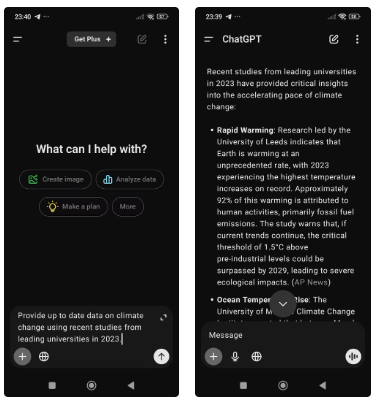How to force ChatGPT Search to use high quality sources
Using ChatGPT to collect data can save you a significant amount of time. However, the accuracy and reliability of the results depend heavily on the quality of the information the model uses. The good news is that you can use a number of strategies to force ChatGPT to only provide responses based on high-quality sources.
1. Determine the source type

Although ChatGPT has been trained on a wide variety of data from a variety of sources (until it reaches a knowledge threshold), it does not actively search the web in response to a prompt. Instead, it relies on existing knowledge, which may be outdated or incomplete. Now, it can actively search the web if you specify it to, but it does not always do this automatically.
The first step to ensuring ChatGPT uses high-quality sources is to specify the type of source you want. You can do this by including terms like peer-reviewed, academic, official, credible, government, or reputable news agency in your prompt.
For example, if you want to find information about climate change, the search prompt "Tell me about climate change with scholarly research articles and peer-reviewed studies" will guide ChatGPT to focus on higher-quality sources than it might otherwise choose.
2. Use specific instructions

One of the unique features of ChatGPT is the ability to create references and citations when prompted. You can encourage this by specifically asking for citations or sources that are reputable and trustworthy authorities.
To ensure reliable sources, you can tell the AI to base its responses on prominent academic figures, research articles, or official reports from organizations like the World Health Organization (WHO) and the United Nations (UN).
For example, if you want to ask ChatGPT to provide accurate information about the theory of evolution, you can tell it to reference the work of Charles Darwin and other famous geneticists, then provide links to the sources.
3. Request Recent Updates and Data

Another useful tactic is to explicitly ask ChatGPT to provide the most recent information it can provide. By specifying a time frame, such as a specific year, you reduce the likelihood of receiving outdated or less relevant information. ChatGPT will filter through its training data to focus on the most recent and reliable data as it trains.
So, for example, if you want data on climate change, instead of asking ChatGPT to give you relevant information on the topic, you can specify that it should provide information based on research and reports from reputable organizations, such as leading universities. Since ChatGPT has access to the Internet, it can specifically provide the most up-to-date information you request.
By being very specific, you increase the chances that ChatGPT will generate a response that matches the authoritative sources you seek. Its knowledge is primarily derived from reputable academic texts, scientific journals, and public reports, so being forceful in your prompt increases the likelihood that the result is the most current information available.
Ultimately, to get the best results from ChatGPT, it's important to be proactive about the quality of the sources you ask ChatGPT to review. And of course, to be completely safe, never rely solely on the content ChatGPT generates. Cross-checking with trusted platforms and using reputable fact-checkers or academic databases like Google Scholar or PubMed can help you verify the accuracy and reliability of information.